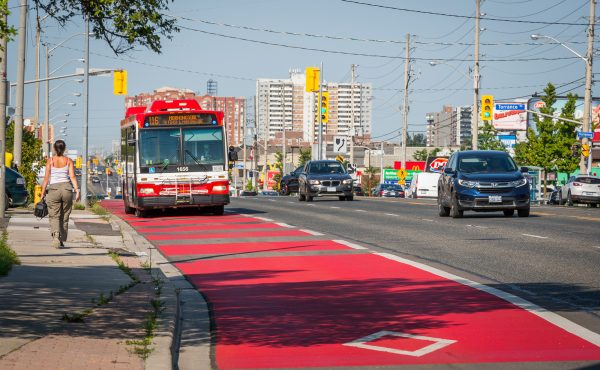
Toronto is among the top 10 economic centres in the world, according to Standard & Poor’s.
A provider of financial market intelligence, S&P’s praise for Toronto comes on the heels of a business-friendly year at City Hall that featured tax incentives for employers, fast-tracked tax relief for small businesses and reduced water rates for high-volume commercial consumers.
Outranking more than 15,000 local, state and regional jurisdictions with at least one million residents, Toronto was lauded for “its depth of services, and deep and well-diversified economy.â€
The report, which appears to be unavailable online, also named Chicago, London, Los Angeles, Madrid, Milan, Moscow, New York City, Paris and Yokohama to its top 10.
Mayor David Miller had this to say in a City of Toronto press release:
“Toronto’s continued placement along side the world’s greatest cities confirms that the quality of life we enjoy is highly sought after and serves as a model for other urban centres,†said Mayor David Miller. “We are committed to providing valuable, high quality programs and services that have the greatest impact on the lives of our residents and the livelihood of our businesses. Our successes in securing a New Deal for Toronto, improving access to our waterfront, laying out a bold plan to tackle climate change, revitalizing major infrastructure such as Nathan Phillips Square and Union Station, and keeping our streets and public places clean and beautiful are what make Toronto a city that is liveable, prosperous and provides opportunity for all.
“But, we can’t rest on our laurels,†Mayor Miller continued. “One of the things all of the world’s great cities have in common is a strong relationship with their state and federal governments. The most successful communities are those that receive the support they need from the other orders of government in their country, and share the responsibility for building and maintaining a high quality of life. In order to maintain the quality of life that Torontonians expect and deserve, this city needs meaningful partnerships with the federal government to deliver a national transit strategy and further to provide all of Canada’s municipalities with a share of revenues that grow with the economy – like the equivalent of one cent of the GST.â€
The unusually long, 1,500-word presser, which details the findings of 13 additional independent reports released between 2005 and 2007 and shows Toronto as a world leader in quality of life and economic prosperity, was mystifyingly released on New Years Eve. As can be expected with a distribution date usually set aside for bad news, this good news story has received no coverage in the mainstream media.
Photo by EverySpoon




16 comments
If I am to look at the news from your city hall in the last year, I have much doubt that this would have been reported because it’s not depressing or bad enough.
Indeed. I am astonished on an almost daily basis by the dreary tone of so much media coverage of virtually every Toronto issue. Every time anything even remotely undesirable occurs anywhere, it’s a sign of “decline.” In The Star’s megacity retrospective the other day, Christopher Hume wrote–presumably with a straight face–of Toronto’s being in a “downward spiral.” Um, if you’ll excuse my language, what the !&#% is he talking about?
Then there’s the habit of so many commentators (and, I’m afraid, many ordinary Torontonians), of talking about the city like it’s some dreary Midwestern third-tier town. One wonders, have these people ever been to a place with real problems? Probably 99% of large cities in the world–yes, the world–would absolutely kill to be in Toronto’s position right now, right across the board. The amount we take for granted, or outright ignore, is astonishing.
I think a lot of the talk about decline is nostalgic reflection to when the city was smaller and had less crime. There also seems to be some nostalgia for “pre-amalgamation” Toronto, as that is situated as a time when city services functioned well.
At the same time, the data on poverty and child poverty in Toronto is extremely troubling. It’s hard to feel at ease when those numbers are so strong.
And I would also take caution in uncritical celebration of the city’s economic clout, as such a measure clearly does not take into account social problems. Toronto’s economy is truly extraordinary – something that we definitely take for granted – but these sorts of rankings aren’t directed at poverty, health, pollution, etc.
It is however, very impressive, and surprising, that the city does rank as top ten centre, ahead of Tokyo, Hong Kong, Singapore, Beijing, and Shanghai. That Milan and Madrid are also there surprises me as well.
Hi Adam – Happy New Year. I just want to assure you and your readers that the decision to issue this news release on New Years Eve day was a conscious decision based on the simple fact that Dec. 31 is a traditionally slow one for news. There’s room, we believe, for perspective, context and analysis amid the “bad news.”
As well, the content of the release served as an excellent year-ender: Toronto, on many levels, is serving its residents and businesses well.
Today’s National Post, by the way, breaks the release out into a handy chart for its readers.
Regards,
Brad Ross
City of Toronto
Thanks for writing, Brad.
I’m glad the Post picked up the story today and gave it appropriate attention (that was alotta column inches for good news!) because at the time I was writing I was disappointed that more people wouldn’t be celebrating the accomplishments of our city. Though, to my point, I think that the Post’s coverage is indicative of when the timing would have been most opportune.
Anyways, the fact that we’re quibbling over timing of a good news story means that you’re doing a great job.
Cheers,
Adam
Report (registration required).
@Dave: Very good indeed to be ahead of some big centres. I wasn’t surprised so much by Milano–N Italy is pretty much its own country these days, and a very rich one at that–but Madrid is rather unexpected. Goes to show that the Spaniards’ drive to give their country a real boost internationally is working, and that a good infrastructure goes a long way. The amount of public works underway in Madrid must be greater than any other city outside China.
Regarding the online report needing registration…
Always good to check out http://www.bugmenot.com to find a login you can use. They do have one for S&P:
login: nul@localhost.net p/w: qwerty
The piazza milano in front of the piazza princes’ gates shows our recognition of the close connection Toronto has to Milan.Every torontonian should go down there and sip an espresso while sitting on the ultra comfortable granite monuments.It just shows how great our city really is.
So Toronto is among the top 10 economic centres in the world. How do we get Stephen Harper to read this???
The usual Toronto-sucks, the-mayor-sucks, naysayers aren’t commenting on this post….
Well, then here’s some more to chew on from the report, perhaps.
Of the ten cities picked, Toronto was 8th in unemployment and GDP per capita, and also 8th in terms of the proportion of employment that is in the services sector (78%) versus manufacturing and other (22%) — only Moscow and Milan had a less services-centric economy.
I don’t know whether these things are related, but I guess they might be. Manufacturing jobs are the kind that are most likely to migrate to lower-cost labour markets, I guess. Such jobs can get more and more specialized and require more and more skill to earn higher and higher salaries, sure. But at a certain point of specialization it’s no longer a manufacturing job at all, but a services one (e.g. research), right?
Oh, and here’s their blurb on Toronto (City of)( AA/Stable/A-1+)
Strengths: Deep and well-diversified economy; moderate but increasing debt burden; healthy cash and investment balances; significant new provincial and federal grants; new taxing powers. Weaknesses: Very large infrastructure deficiency and capital demands; likelihood of continued increases in debt; large unfunded employee benefit obligations. Outlook: The stable outlook reflects our expectation that there will be no material increase in the city’s prospective debt burden beyond current expectations and that the local economy will continue to produce solid results and positive taxable assessment base growth. We also expect that operating surpluses and after-capital deficits will improve somewhat with the imposition of new taxes and new grant streams from the provincial and federal governments. A significant and sustained increase in operating surpluses leading to a reduction or cancellation of planned debt issuance in the next three years, with material progress made on the city’s infrastructure deficiency, could lead use to raise the ratings. Conversely, a material deterioration in Toronto’s debt burden and continued deterioration in operating surpluses could lead to a downward rating action.
I think the reason many Torontonians are pessimistic (and I admit I’m sometimes one of them) is because although Toronto, of all world cities with a population above 2 million, is unequalled in terms of quality of life, crime rate, pollution, economic health etc, etc, there’s this sense that things have stagnated. We haven’t seen any major public investment in this city for over 20 years (hence the crumbling infrastructure issue). The problem with Toronto is not that we’re doing bad relative to other cities, but that deep down we know we could be light years better than any other major urban centre. We want to be the greenest, most pedestrian/cyclist friendly, most business attractive, culturally advanced-diverse, innovative city in the world. With some sacrifice, bold leadership and a lot of work, we know we can do it, but the fact is our civic leadership is really poor and content to just coast along causing the least amount of waves. Greatness requires risk and a willingness to take chances. When was the last time that Toronto (and even Canada as a matter of fact) took a chance?
As an aside, here’s an interesting article concerning Chicago’s transit system. We think our TTC is bad and the city’s relation with the province is dysfunctional. It seem we’re nowhere near as bad as we think. I’m not trying to gloat or anything like that, but I just want to show that Toronto is not the only city that gets bad treatment from senior governments.
http://www.economist.com/world/na/displaystory.cfm?story_id=10431680
Yes we can do better!
But the public must want to participate first!
So a suit organisation likes Suitville. How is this a surprise? Keep kowtowing to Wall St. Toronto and I’m sure they’ll throw you a another bone next year. Maybe bigger video screens for Dundas Square? (or for whoever has bought the naming rights)
Uh?